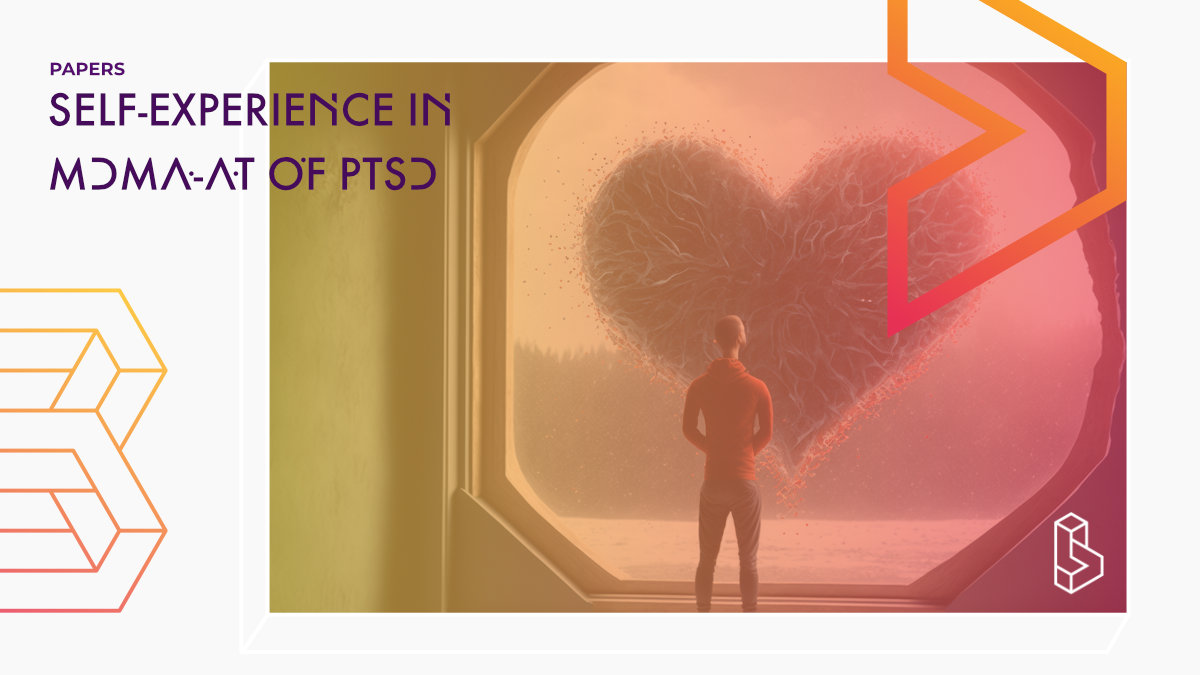This re-analysis of an RCT of MDMA-assisted therapy for PTSD finds that study participants (n=90) had significant improvements in the measures of self-experience (e.g. alexithymia – the inability to identify & describe emotions experienced by oneself). The change in scores of self-experience correlates with recovery from PTSD.
Abstract
“Introduction There is a resurgence of interest in the therapeutic potential of psychedelic substances such as 3,4-methylenedioxymethamphetamine (MDMA). Primary findings from our randomized, double-blind, placebo-controlled, multi-site Phase 3 clinical trial of participants with severe PTSD (NCT03537014) showed that MDMA-assisted therapy induced significant attenuation in the Clinician-Administered PTSD Scale for DSM-5 compared to Therapy with placebo. Deficits in emotional coping skills and altered self-capacities constitute major obstacles to successful completion of available treatments. The current analysis evaluated the differential effects of MDMA-assisted therapy and Therapy with placebo on 3 transdiagnostic outcome measures and explored the contribution of changes in self-experience to improvement in PTSD scores.
Methods Participants were randomized to receive manualized therapy with either MDMA or placebo during 3 experimental sessions in combination with 3 preparation and 9 integration therapy visits. Symptoms were measured at baseline and 2 months after the last experimental session using the 20-item Toronto Alexithymia Scale (TAS-20), the 26-item Self Compassion Scale (SCS), and the 63-item Inventory of Altered Self-Capacities (IASC).
Results 90 participants were randomized and dosed (MDMA-assisted therapy, n = 46; Therapy with placebo, n = 44); 84.4% (76/90) had histories of developmental trauma, and 87.8% (79/90) had suffered multiple traumas. MDMA-assisted therapy facilitated statistically significant greater improvement on the TAS-20, the SCS, and most IASC factors of interpersonal conflicts; idealization disillusionment; abandonment concerns; identity impairment; self-awareness; susceptibility to influence; affect dysregulation; affect instability; affect skill deficit; tension reduction activities; the only exception was identity diffusion.
Conclusion Compared with Therapy with placebo, MDMA-assisted therapy had significant positive effects on transdiagnostic mental processes of self-experience which are often associated with poor treatment outcome. This provides a possible window into understanding the psychological capacities facilitated by psychedelic agents that may result in significant improvements in PTSD symptomatology.”
Authors: Bessel A. van der Kolk, Julie B. Wang, Rachel Yehuda, Leah Bedrosian, Allison Cooker, Charlotte Harrison, Michael Mithoefer, Berra Yazar-Klosinki, Amy Emerson & Rick Doblin
Summary of Effects of MDMA-assisted therapy for PTSD on self-experience
In recent years, there has been a resurgence of interest in the therapeutic potential of psychedelic substances such as psilocybin, ketamine and phenethylamines. Drug-facilitated psychotherapy may be the future of psychiatric medicine.
MDMA-assisted therapy (MDMA-AT) was found to induce significant attenuation in PTSD symptom severity scores in individuals with severe PTSD. This study explored the differential effects of therapy alone vs psychedelic-assisted therapy to gain a deeper understanding of the psychological change processes induced by psychedelic therapies. Trauma-focused psychotherapy is considered a first-line treatment for PTSD, but the overall success rate has been relatively disappointing. Many patients remain challenged by difficulties in emotion regulation, impulse control and interpersonal functioning.
Multiple studies have shown that reduced self-capacities interfere with the successful completion of psychotherapy for PTSD, including difficulties negotiating interpersonal conflicts and negative self-appraisals, such as shame, self-blame and lack of self-compassion. In addition, low self-compassion is associated with poor treatment responses.
Find this paper
Effects of MDMA-assisted therapy for PTSD on self-experience
https://doi.org/10.1101/2023.01.03.23284143
Open Access | Google Scholar | Backup | 🕊
Authors
Authors associated with this publication with profiles on Blossom
Michael MithoeferMichael Mithoefer is a psychiatrist and a Clinical Investigator and acting Medical Director of MAPS Public Benefit Corporation.
Rick Doblin
Rick Doblin Ph.D. is the founder of MAPS. His persistent work since 1986 has been one of the main drivers behind why psychedelics (including MDMA) are now coming back to therapy.
Compound Details
The psychedelics given at which dose and how many times
MDMA 80 - 120mg | 3x
Linked Research Papers
Notable research papers that build on or are influenced by this paper
MDMA-assisted therapy for severe PTSD: a randomized, double-blind, placebo-controlled phase 3 studyThis double-blind, placebo-controlled study (n=90) finds that MDMA-assisted therapy (3x 80-120mg) is effective (d=.91, large effect size) in the treatment of PTSD. 67% of those in the MDMA-group no longer qualified for PTSD (vs 32% for the therapy-only group). This study is part of the Phase III trial to get MDMA approved by the FDA.
Linked Clinical Trial
A Multi-Site Phase 3 Study of MDMA-Assisted Psychotherapy for PTSD (MAPP1)Posttraumatic stress disorder (PTSD) is a debilitating psychiatric disorder that can develop after a traumatic life experience that severely reduces the quality of life. This multi-site, double-blind, placebo-controlled, randomized Phase 3 study assessed the efficacy and safety of MDMA-assisted psychotherapy compared to psychotherapy with placebo in participants diagnosed with at least moderate PTSD.

